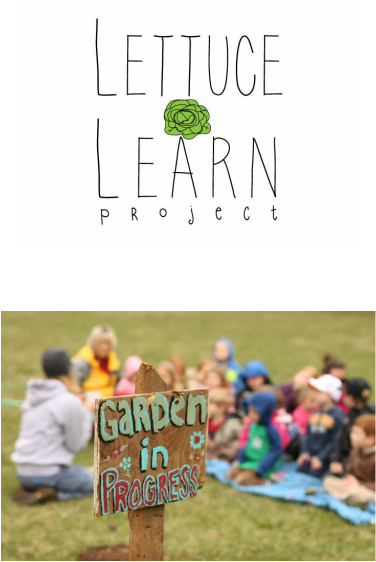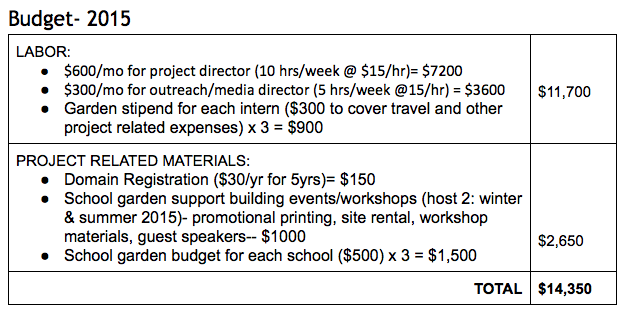Lettuce Learn

A garden can serve as a platform to teach a variety of important lessons in an experiential and place-based way. In a well designed school garden program, math, geography, history, regional heritage, nutrition, visual arts, science, technology, life skills, literature, and a love of nature can all be explored in the outdoor classroom. The possibilities of garden-based learning are endless, bounded merely by imagination and creativity. However, the realities of running and sustaining a school garden program often lead to teacher burnout, insufficient maintenance, limited funding, and under utilization. Within Watauga County alone, numerous school gardens have come and gone and seen varying degrees of success over the years.
To help ensure the success of school gardens, a well-planned gardening program must be put in place and supported by multiple stakeholders. Because schools are already under pressure to perform well, exceed standards, and cover an exceedingly high amount of material, teachers and staff are often unable to put in the time required to develop a vibrant gardening program.
Perhaps most importantly, the Lettuce Learn Project will oversee an internship program to provide well-trained interns who will serve as garden coordinators at each partner school. For the first year of implementation, interns will be provided to three pilot schools (ASU Child Development Center, Parkway Elementary, and Cove Creek). Interns from a variety of disciplines (nutrition, sustainable development, education, anthropology, outdoor recreation, biology, geography, etc.) will be recruited from Appalachian State, will undergo a thorough online training course, and be provided with adequate resources to meet the needs of their assigned school garden program. From April to October, interns will work with PreK gardens to maintain the garden and prepare weekly lesson plans for the students. Interns assigned to gardens at K-12 schools will begin by working with after school staff to create garden programming from April-June and Sep-Oct (later phases of the Lettuce Learn project will focus on standards-based curriculum integration and teacher training, once the gardens are well established). During summer break, K-12 interns will coordinate with local food pantries, summer programs, camps, 4-H and other child-care and summer programing groups to utilize the garden and its produce adequately. Interns will also be required to meet with Lettuce Learn leadership on a bi-weekly basis (virtually or in person) and will be required to help mentor and support the next batch of Lettuce Learn interns (virtually or in person).
In addition to the much needed internship program, the Lettuce Learn Project will connect school gardens to their community and aim to meet the material needs of school gardens by creating a strong, easily accessible network of school garden support. The Lettuce Learn website (lettucelearn.org) will feature an interactive on-line visual diagram where interested parties can easily find the local resources they are seeking. Teachers can post if they have a school garden need-- from an agricultural guest speaker to a truck full of compost. Individuals, nonprofits, and businesses can post their particular skills/talents/supplies that they’re willing to donate to any school garden of their choice. A skeleton of this interactive visual network can be found here.
By supporting the Lettuce Learn project, you are investing in our community’s future. Vibrant school garden programs educate posterity about growing healthy food in environmentally friendly ways while also providing opportunities for experiential education to improve academic retention. Together, we can help create a future generation that is able to provide for and care for themselves, each other, and the places they live.
To help ensure the success of school gardens, a well-planned gardening program must be put in place and supported by multiple stakeholders. Because schools are already under pressure to perform well, exceed standards, and cover an exceedingly high amount of material, teachers and staff are often unable to put in the time required to develop a vibrant gardening program.
Perhaps most importantly, the Lettuce Learn Project will oversee an internship program to provide well-trained interns who will serve as garden coordinators at each partner school. For the first year of implementation, interns will be provided to three pilot schools (ASU Child Development Center, Parkway Elementary, and Cove Creek). Interns from a variety of disciplines (nutrition, sustainable development, education, anthropology, outdoor recreation, biology, geography, etc.) will be recruited from Appalachian State, will undergo a thorough online training course, and be provided with adequate resources to meet the needs of their assigned school garden program. From April to October, interns will work with PreK gardens to maintain the garden and prepare weekly lesson plans for the students. Interns assigned to gardens at K-12 schools will begin by working with after school staff to create garden programming from April-June and Sep-Oct (later phases of the Lettuce Learn project will focus on standards-based curriculum integration and teacher training, once the gardens are well established). During summer break, K-12 interns will coordinate with local food pantries, summer programs, camps, 4-H and other child-care and summer programing groups to utilize the garden and its produce adequately. Interns will also be required to meet with Lettuce Learn leadership on a bi-weekly basis (virtually or in person) and will be required to help mentor and support the next batch of Lettuce Learn interns (virtually or in person).
In addition to the much needed internship program, the Lettuce Learn Project will connect school gardens to their community and aim to meet the material needs of school gardens by creating a strong, easily accessible network of school garden support. The Lettuce Learn website (lettucelearn.org) will feature an interactive on-line visual diagram where interested parties can easily find the local resources they are seeking. Teachers can post if they have a school garden need-- from an agricultural guest speaker to a truck full of compost. Individuals, nonprofits, and businesses can post their particular skills/talents/supplies that they’re willing to donate to any school garden of their choice. A skeleton of this interactive visual network can be found here.
By supporting the Lettuce Learn project, you are investing in our community’s future. Vibrant school garden programs educate posterity about growing healthy food in environmentally friendly ways while also providing opportunities for experiential education to improve academic retention. Together, we can help create a future generation that is able to provide for and care for themselves, each other, and the places they live.


